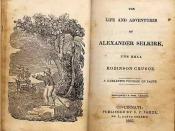For centuries literary critiques have commented on Robinson Crusoe's spiritual and religious change, saying that he grew as an individual on a spiritual and religious level. Robinson Crusoe started out as a young man who was obtuse, materialistic, naive, and incredibly primitive when it came to issues such as religion. The incredible circumstances that Robinson Crusoe underwent caused him to re-evaluate his dealings with G-d and eventually develop onto a deeper spiritual, internal plane. Having spent twenty-eight long years on an uninhabited island, disconnected from the rest of world, Crusoe became closer with himself as well as with G-d. Critiques will argue that Crusoe matured as a person and connected with G-d, which he was unable to do while connected to the rest of the world. It may appear logical that this particular argument can be made because someone placed into such extreme solitude will eventually deal with pivotal issues such as G-d, religion, and spirituality in general.
However, is it possible that this argument is not entirely valid? Perhaps the above statements can be argued and countered. In fact, perhaps Robinson Crusoe experienced little to no religious growth, only calling upon G-d in situations where G-d was desperately needed. When analyzing Crusoe's experience to its furthest degree a strong counter argument can be created to prove that Robinson Crusoe did not have such internal growth as critiques believe. Crusoe's lack of internal growth is a reflection of his own obtuseness. Crusoe was not a very religious man before he came upon the island, and after twenty-eight long years he rejoined the rest of humanity having had no growth within the spiritual and religious worlds.
Prior to departing on his journeys out to sea, Robinson Crusoe was not a very religious man nor did he...


